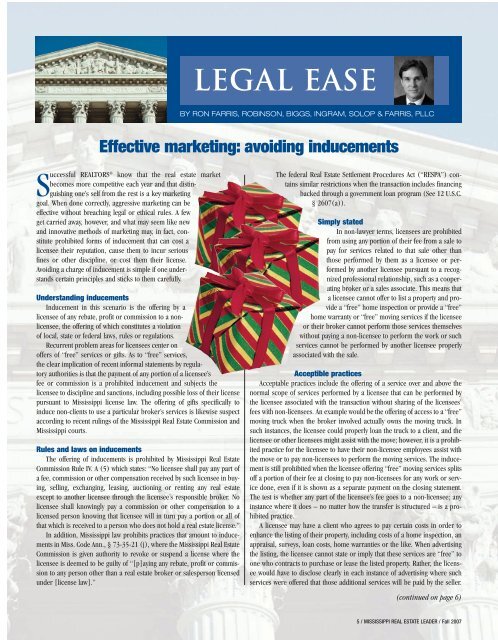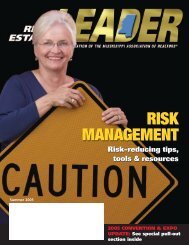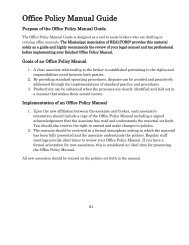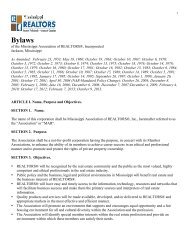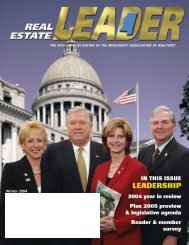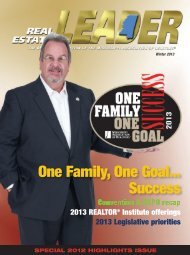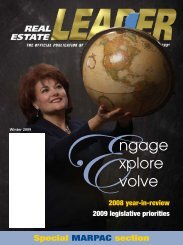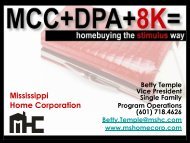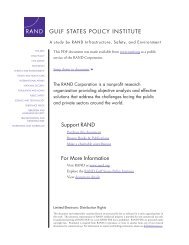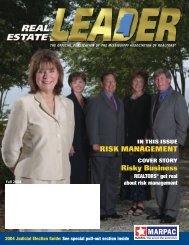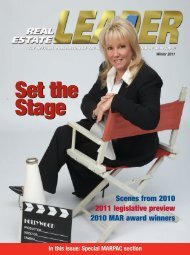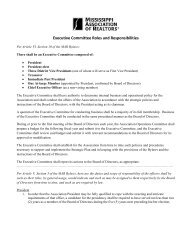life's highway - Mississippi Association of REALTORS
life's highway - Mississippi Association of REALTORS
life's highway - Mississippi Association of REALTORS
You also want an ePaper? Increase the reach of your titles
YUMPU automatically turns print PDFs into web optimized ePapers that Google loves.
LEGAL EASE<br />
BY RON FARRIS, ROBINSON, BIGGS, INGRAM, SOLOP & FARRIS, PLLC<br />
Effective marketing: avoiding inducements<br />
Successful<br />
®<br />
<strong>REALTORS</strong> know that the real estate market<br />
becomes more competitive each year and that distinguishing<br />
one’s self from the rest is a key marketing<br />
goal. When done correctly, aggressive marketing can be<br />
effective without breaching legal or ethical rules. A few<br />
get carried away, however, and what may seem like new<br />
and innovative methods <strong>of</strong> marketing may, in fact, constitute<br />
prohibited forms <strong>of</strong> inducement that can cost a<br />
licensee their reputation, cause them to incur serious<br />
fines or other discipline, or cost them their license.<br />
Avoiding a charge <strong>of</strong> inducement is simple if one understands<br />
certain principles and sticks to them carefully.<br />
Understanding inducements<br />
Inducement in this scenario is the <strong>of</strong>fering by a<br />
licensee <strong>of</strong> any rebate, pr<strong>of</strong>it or commission to a nonlicensee,<br />
the <strong>of</strong>fering <strong>of</strong> which constitutes a violation<br />
<strong>of</strong> local, state or federal laws, rules or regulations.<br />
Recurrent problem areas for licensees center on<br />
<strong>of</strong>fers <strong>of</strong> “free” services or gifts. As to “free” services,<br />
the clear implication <strong>of</strong> recent informal statements by regulatory<br />
authorities is that the payment <strong>of</strong> any portion <strong>of</strong> a licensee’s<br />
fee or commission is a prohibited inducement and subjects the<br />
licensee to discipline and sanctions, including possible loss <strong>of</strong> their license<br />
pursuant to <strong>Mississippi</strong> license law. The <strong>of</strong>fering <strong>of</strong> gifts specifically to<br />
induce non-clients to use a particular broker’s services is likewise suspect<br />
according to recent rulings <strong>of</strong> the <strong>Mississippi</strong> Real Estate Commission and<br />
<strong>Mississippi</strong> courts.<br />
Rules and laws on inducements<br />
The <strong>of</strong>fering <strong>of</strong> inducements is prohibited by <strong>Mississippi</strong> Real Estate<br />
Commission Rule IV. A (5) which states: “No licensee shall pay any part <strong>of</strong><br />
a fee, commission or other compensation received by such licensee in buying,<br />
selling, exchanging, leasing, auctioning or renting any real estate<br />
except to another licensee through the licensee’s responsible broker. No<br />
licensee shall knowingly pay a commission or other compensation to a<br />
licensed person knowing that licensee will in turn pay a portion or all <strong>of</strong><br />
that which is received to a person who does not hold a real estate license.”<br />
In addition, <strong>Mississippi</strong> law prohibits practices that amount to inducements<br />
in Miss. Code Ann., § 73-35-21 (j), where the <strong>Mississippi</strong> Real Estate<br />
Commission is given authority to revoke or suspend a license where the<br />
licensee is deemed to be guilty <strong>of</strong> “[p]aying any rebate, pr<strong>of</strong>it or commission<br />
to any person other than a real estate broker or salesperson licensed<br />
under [license law].”<br />
The federal Real Estate Settlement Procedures Act (“RESPA”) contains<br />
similar restrictions when the transaction includes financing<br />
backed through a government loan program (See 12 U.S.C.<br />
§ 2607(a)).<br />
Simply stated<br />
In non-lawyer terms, licensees are prohibited<br />
from using any portion <strong>of</strong> their fee from a sale to<br />
pay for services related to that sale other than<br />
those performed by them as a licensee or performed<br />
by another licensee pursuant to a recognized<br />
pr<strong>of</strong>essional relationship, such as a cooperating<br />
broker or a sales associate. This means that<br />
a licensee cannot <strong>of</strong>fer to list a property and provide<br />
a “free” home inspection or provide a “free”<br />
home warranty or “free” moving services if the licensee<br />
or their broker cannot perform those services themselves<br />
without paying a non-licensee to perform the work or such<br />
services cannot be performed by another licensee properly<br />
associated with the sale.<br />
Acceptible practices<br />
Acceptable practices include the <strong>of</strong>fering <strong>of</strong> a service over and above the<br />
normal scope <strong>of</strong> services performed by a licensee that can be performed by<br />
the licensee associated with the transaction without sharing <strong>of</strong> the licensees’<br />
fees with non-licensees. An example would be the <strong>of</strong>fering <strong>of</strong> access to a “free”<br />
moving truck when the broker involved actually owns the moving truck. In<br />
such instances, the licensee could properly loan the truck to a client, and the<br />
licensee or other licensees might assist with the move; however, it is a prohibited<br />
practice for the licensee to have their non-licensee employees assist with<br />
the move or to pay non-licensees to perform the moving services. The inducement<br />
is still prohibited when the licensee <strong>of</strong>fering “free” moving services splits<br />
<strong>of</strong>f a portion <strong>of</strong> their fee at closing to pay non-licensees for any work or service<br />
done, even if it is shown as a separate payment on the closing statement.<br />
The test is whether any part <strong>of</strong> the licensee’s fee goes to a non-licensee; any<br />
instance where it does – no matter how the transfer is structured – is a prohibited<br />
practice.<br />
A licensee may have a client who agrees to pay certain costs in order to<br />
enhance the listing <strong>of</strong> their property, including costs <strong>of</strong> a home inspection, an<br />
appraisal, surveys, loan costs, home warranties or the like. When advertising<br />
the listing, the licensee cannot state or imply that these services are “free” to<br />
one who contracts to purchase or lease the listed property. Rather, the licensee<br />
would have to disclose clearly in each instance <strong>of</strong> advertising where such<br />
services were <strong>of</strong>fered that those additional services will be paid by the seller.<br />
(continued on page 6)<br />
5 / MISSISSIPPI REAL ESTATE LEADER / Fall 2007


